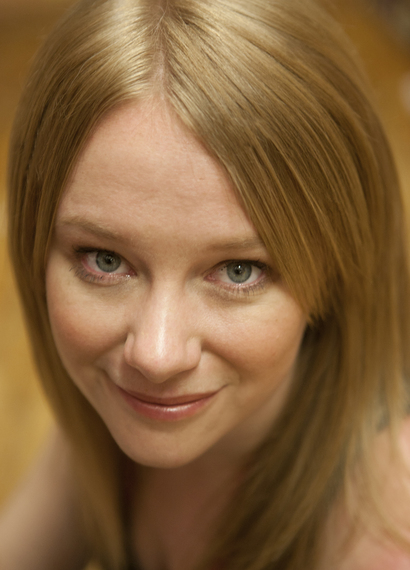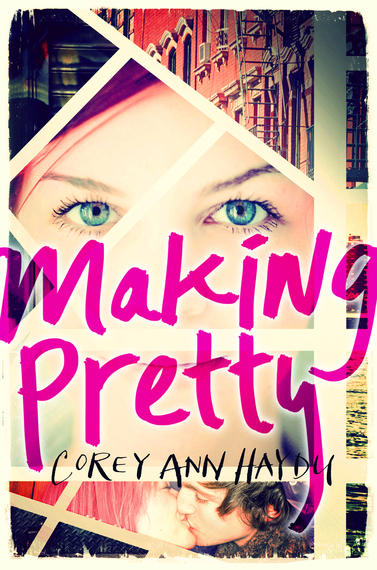Corey Ann Haydu is the author of new release, Making Pretty, OCD Love Story, and Life by Committee. We talked about what it means to be a young adult author and what she would like her readers to know about being pretty and being loved.
When did the writing bug first bite you?
I've been writing pretty much my whole life. I wrote a very dark picture book with my best friend when we were eight and I started keeping journals when I was nine. I was a diligent journaler and sometimes wrote stories in the pages of those journals as well. When I was maybe ten, I did a long series of stories about the little people inside our bodies who are in charge of our different body parts--the tiny workers who run the heart and the brain and the stomach. That was probably my first large-scale writing project. I am itching to go back and read it--it's in a trunk in my office that houses my twenty years of journals!
How did you know you wanted to specialize in Young Adult fiction?
I really didn't know much about YA fiction until I started working in publishing in 2009. I had been pursuing an acting career and knew it wasn't the right fit for me--I would get an audition and be angry that it would cut into my writing time! I figured I'd start to get to know the industry by taking an internship, and the one I ended up taking happened to be with an agency specializing in YA and Children's literature. I took it because I liked the people and was interested in learning something new. My boss handed me The Hunger Games and Savvy and Little Brother, and my mind was blown. I didn't know how many interesting, unique things were happening in YA and Children's literature! I knew right away that's where I was meant to be. I was in the middle of applying to grad schools and instead of taking a place in an adult fiction MFA program, I decided to follow my heart and get my MFA in Writing for Children.

You tackled the healing power of love in OCD Love Story, while Making Pretty takes a slightly different view of falling in love. What do you hope your readers learn from your books about this all too confusing emotion?
I'm not sure I can really teach anyone about love--I think we are all going to be learning about love throughout our whole lives. But I do like questioning what love looks like and what role it plays in our lives. It's such an interesting subject matter, since it's this intangible thing that we treat as if it is totally tangible. I hope my books help teens see how many different forms love can take, and also see that love isn't exactly a solution to life's problems, as beautiful as it can be. I think at any age it's good to ask why do I love this person? What do I love about them? What makes it love?
Making Pretty raises some interesting issues around physical beauty and transformation. How would you define pretty?
I have been giving a lot of though to the word pretty in the last few months, as I've been looking forward to the release of this book. I think it's a word with a lot of pressure attached to it. Especially for young girls. Even though when I was a teenager I understood that it was great to be smart and talented and funny and brave, I was the most anxious about being pretty. I felt its importance really early on, and I took it on as a kind of goal. In some ways the word pretty is a little like the word love-- it only has the meaning we assign to it. There isn't a definitive pretty, but we act as if there is. I still feel the echoes of my concern with prettiness, it still feels like a large and important word to me, but in writing this book I hoped to dismantle it a bit-- for myself and for readers. I'd like to strip it of its importance, so that we can focus on all the other great things we can be. But for now, if I'm entirely honest, it's still a word that haunts me.
What issues would you love to see dealt with more frankly in young adult books?
I'd like to see anger dealt with more in YA literature. Real, deep anger-- I think we're still often uncomfortable with letting girls be angry. I'd love to see more books featuring characters with different financial realities-- I think there's a lot to explore there and that socioeconomic issues are underwritten in YA today. I'd love to see more books with friendship as more of a focus than romance. In some ways, teen friendship is more interesting than teen romance.
But honestly, I'm up for any book that wants to dig deep into the interior lives of teens and the honest, uncomfortable, unpleasant feelings that happen in anyone's life.
Who did you read when you were a teen?
I fell in love with Sylvia Plath as a teenager. The Bell Jar was my favorite book and then I discovered her poetry and really couldn't get enough. I also had a pretty intense love affair with The House on Mango Street. My senior year project was writing a book of vignettes, inspired by that incredible book. I loved how Cisneros looked at small moments, and that those small moments took on greater meaning. That's exactly what I was interested in writing. That's how I experience the world.
What is your writing process like? How do you tackle writing a novel?
I have a very, very messy writing process. I often know almost nothing about the book I'm writing when I started writing it. When I started writing Making Pretty all I had was the question: What would it be like to be a teen girl with a plastic surgeon father? I started from there and trusted that a story would emerge. It always does, but sometimes it takes months of writing before I have a plot. For every 80,000 word book I write, I probably have about 300,000 or 400,000 words written-- and that's just for the first draft! I write non-sequential scenes, and piece them together as I go. Usually when I've written about three-quarters of a book, I'll do a kind of outline, using index cards and my kitchen table. That's when I start trying to get a handle on the big picture. I like this process, even though it's a lot of work, because it allows for huge, exciting epiphanies. I learn what the book is about while I'm writing it, and I discover major ideas that change everything. It's an adrenaline rush-- even when it means I'm going to have to throw away a bunch of chapters or reimagine large parts of the story. I write for that moment of realization. It's like an enormous jolt to my brain.
Do you think there is anything different about writing for young adults versus an older audience?
For me, there isn't. For now, I like writing from a teen perspective since I have some distance from that time in my life and the distance frees me up to write honestly and emotionally. But aside from that personal preference, I think the strategies and craft and emotional energy it takes to write a book remains the same. I am writing about teenagers, but mostly I'm writing about people. Teens are all reading adult novels in school, so there's no reason to write differently for them. The benefit of YA is that it is more squarely about things they might be experiencing and is taking their interior lives seriously. But in terms of craft or intent, I don't think there's a difference.
What are the biggest challenges you face as a writer?
I find new challenges with every book. That in and of itself is a challenge-- you never know what to be prepared for when you start a project, and you're constantly surprised and confused by what issues emerge. I also think that balance is a huge challenge for any writer-- work-life balance, as well as balancing your creative impulses with the feedback you're getting. Lately, that's been my biggest challenge. How much do I listen to myself and how much do I take in criticism? Which criticism should get the most weight? How many readers should I show a first draft too? Can I trust myself to know when a project is "good" or "ready"? These are big, scary questions that have grown as I've gotten further into my career. I'm very much still working through them, and I think the answers will evolve over time.
What excites you the most when you are writing?
I guess I answered this question earlier-- I am the most excited about all the things I don't know when I get started. I get excited by feeling my brain work and being surprised by what it comes up with. It's an exhilarating feeling, to discover something you didn't know was in your mind at all. I can't think of another thing in my life that gives me that kind of thrill.
To keep up with Corey Ann Haydu, find her at website or on Twitter @coreyannhaydu

